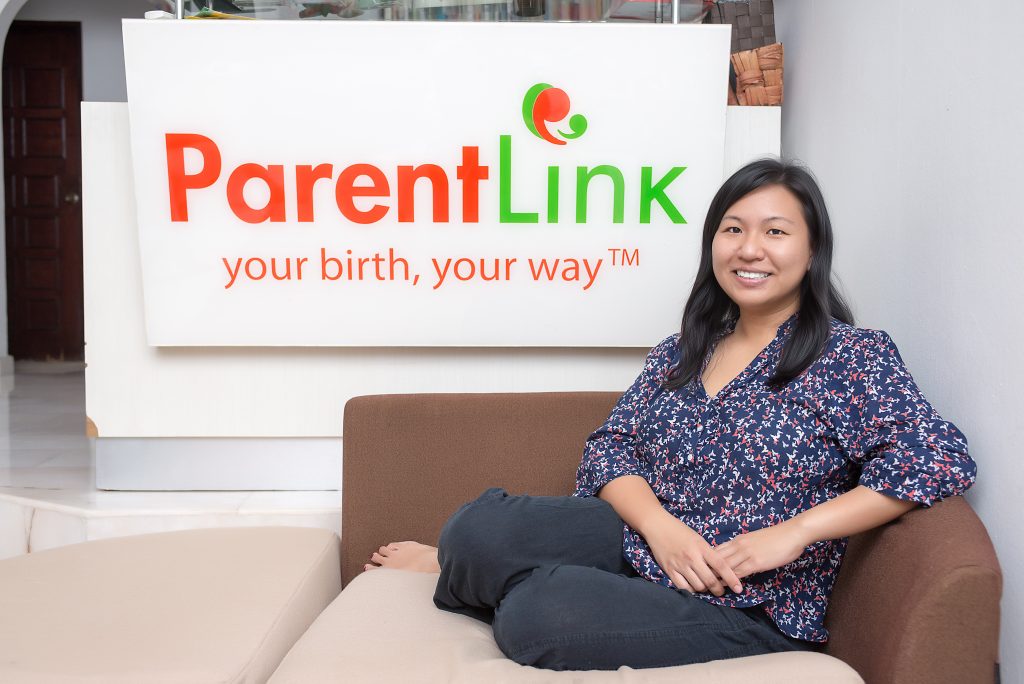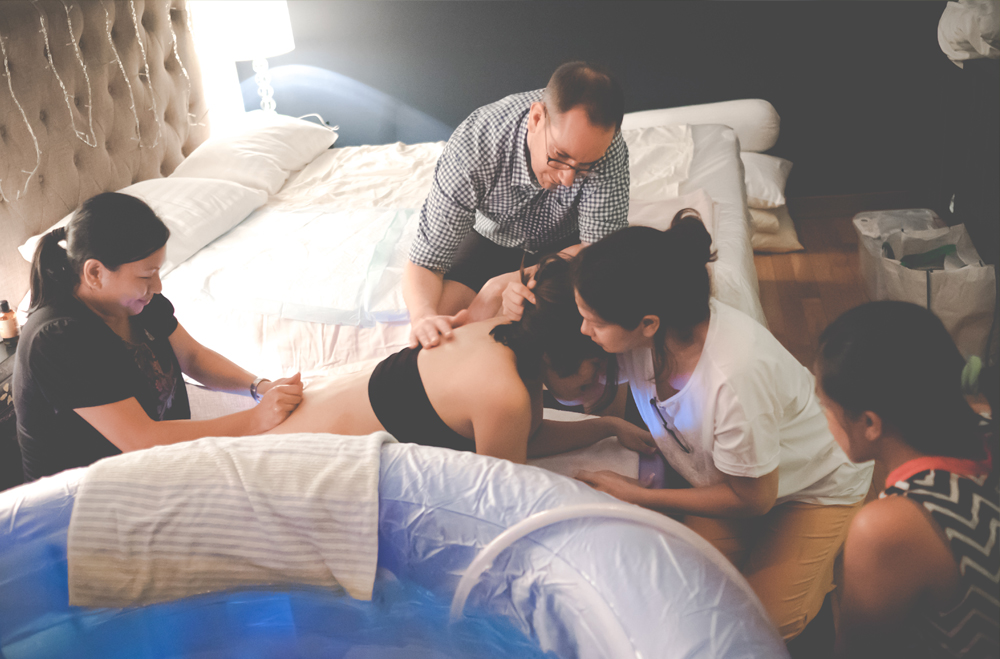You may not have heard of a doula or know what one does but chances are if you’ve given birth, you’ve probably rubbed shoulders with one in the hospital corridor.
Doulas are the unsung heroes in many birthing stories and provide emotional and physical prenatal care and labour support. Research has shown doulas have a significant and positive impact on the labour process with lower caesarean rates, less pain medication and a more satisfying birthing experience.
Mummyfique sits down with current doula and former Novartus scientist, Angelyn Seet, director of Parentlink, a team of birth educators and doulas, to find out what happens in a day in a life of a doula.

Mummyfique: Can you share what a doula is?
Angelyn: A doula is a pregnancy and labour coach who works with expectant parents either prenatally to prepare for the arrival of baby or postpartum to help with breastfeeding and newborn care. I meet with parents several times in the lead up to the big day, and I’m also on call 24 hours a day once they hire me.
As a trained and certified doula, I’ve attended 160 births in five years in both public and private Singapore hospitals. I’ve pretty much seen every type of birth – the highs, lows and miraculous endings but one thing remains true, and that is that women who are calmer and more relaxed during labour have much better outcomes, higher breastfeeding success rates and less postpartum depression.
The best part of my job is empowering a mother to take control of her labour. I also help couples prepare birth plans and provide information on obstetricians to help clients choose their doctor if need be. Each doctor has their own style of practice and we understand their preferences and quirks which can help find the right match.
Can you share what your usual work week is like?
It is very varied and unpredictable, and I need to be very flexible, as I never know when a client is going to go into labour. I could have just finished a tough and exhausting 27-hour labour, but instead of going back to rest, I could go straight back into hospital at any time to support another family. Over the course of a labour, I may use a variety of different tools and techniques to help with pain including visualisation, massages, tens machine and hip squeezes.
Some labours require a great deal of support and reassurance with each contraction, especially if they are first-time months. There was a mum whose hand I held for her entire 27-hour labour and gave her a lot of gentle encouragement to keep her spirits up. I only had two small breaks during the entire duration.
In any given week, I could be woken by my phone ringing in the early hours. Most clients call me between 2am – 4am and they seem to like to catch you in the middle of the night. When I’m called up as a birth is approaching, I meet them at their house and time contractions to decide when to go to the hospital. And I remain with her until the baby is born.
What are the steps involved in preparing a mother for labour as a doula?
My first meeting with a new client is a prenatal appointment at 34 weeks where we talk about a birth plan and the sort of birth she wants. We meet again at 36 weeks to talk about comfort measures and strategies to use in labour to overcome fear. We do a lot of preparation in the lead-up to her birth in terms of what to expect and how her body will respond.
Dads play an important role too as we need to work together as a team in labour. If a client goes over 40 weeks, we schedule a session at 41 weeks to talk about natural induction techniques. And then once labour starts I’m there to give full birth support and will stay until breastfeeding starts and the baby is moved into the mother’s room.
What are the biggest challenges of your job?
The most challenging part of my job is being on call 24 hours a day. But it’s offset by the most rewarding side, which is the birth of a baby. It’s the happiest part of the job when a baby is born. Being a doula is a real commitment as it limits what you can do and where you can go. I can’t take a long weekend away or jump on a boat to a nearby island as I need to be rested and prepared around the clock.
Families rely on me to be available at the drop of a hat and I can’t be exhausted going into a marathon labour. The moment labour starts, I’m busy rescheduling my calendar, moving client meetings and appointments around. I also arrange for my family and children to be taken care as I don’t know how long I’ll be gone. It could be a few hours or a few days. I have a great support network behind me which makes my job easier.

Is it difficult working alongside medical staff?
There are definitely some obstetricians and medical staff who are not supportive of our presence and give us a tough time. I’ve been interrogated about my experience and background and it was intimidating. But usually, when we get down to the business of helping a mother birth her baby, we all work together as a team. I attended one birth with a rather aggressive and unfriendly doctor, but in the end, when he realised the role I’d played in helping the mother remain calm and positive, he shook my hand after the birth. It’s not my job to argue or question the medical staff. I need to stay focused to help the couple birth their baby. My role is to make everyone happy.
Are doulas popular in Singapore?
They are still relatively new in Singapore but it has been gaining more attention due to the many benefits of having one attend labour. Demand for their services exceeds supply as more women are choosing to birth naturally and I estimate that there are about 30 active doulas in Singapore currently. I myself am booked up until December already.
What was one of the most difficult labours you’ve attended?
The first birth I attended in Singapore was an induced birth and it was 24 hours long and a very traumatic experience for the mother. She was past her due date and was induced into labour at the hospital with drugs. However, this can prolong labour and dilation (opening of the cervix).
Some women may not dilate and end up needing a caesarean, as the baby is distressed and not progressing as it should. Usually, half the battle is won when a mother goes into labour naturally as induced women in my experience feel so much more pain than mothers who go into labour spontaneously.
Have you had any unusual requests from a client?
I was invited to bury a placenta with an expat client. The mother asked me to accompany her to a park to help bury it. In her culture, this ritual was thought to improve the health of her baby. Many hospitals incinerate the placenta after birth. It was an honour and a memory I will always cherish.
What advice can you share with pregnant mums and their partners?
Labour is very primal and makes you feel like an animal … it’s one of those events where nature takes over and you just need to release your body and allow it to happen. Mental obstacles like fear or previous traumatic experiences can inhibit the experience you want. But if a woman can release her fear and trust in the process of birth then she is well on her way to having a beautiful experience.
How should mums go about choosing the right doula for themselves?
1. Research, get smart and make appointments to meet a few doulas until you find the right doula with whom you have a connection. Ask around for recommendations as not every doula is right for every family, but a good place to start your search is by asking friends, co-workers or other mums.
2. Make sure your doula is qualified and ask about qualifications and certifications.
3. Ask about experience and how many births they have attended as you want to know that when things get challenging, they’ve got the experience to help you through.
4. Availability – check your doula will be available around your due date as you don’t want to build a great relationship only to find that a back-up doula attends on the day.
5. It’s important to have a contract outlining your expectation and fees as the cost can vary depending on experience. Doulas can vary from $500 to $2000, depending on experience.
Angelyn Seet is a certified doula and the only Bradley Method trained doula in Singapore. She is also the director of Parentlink, which offers birthing classes, newborn care, doula services, first aid, parenting courses and helper training and has the largest team of affiliated birth and postpartum doulas in Singapore.



